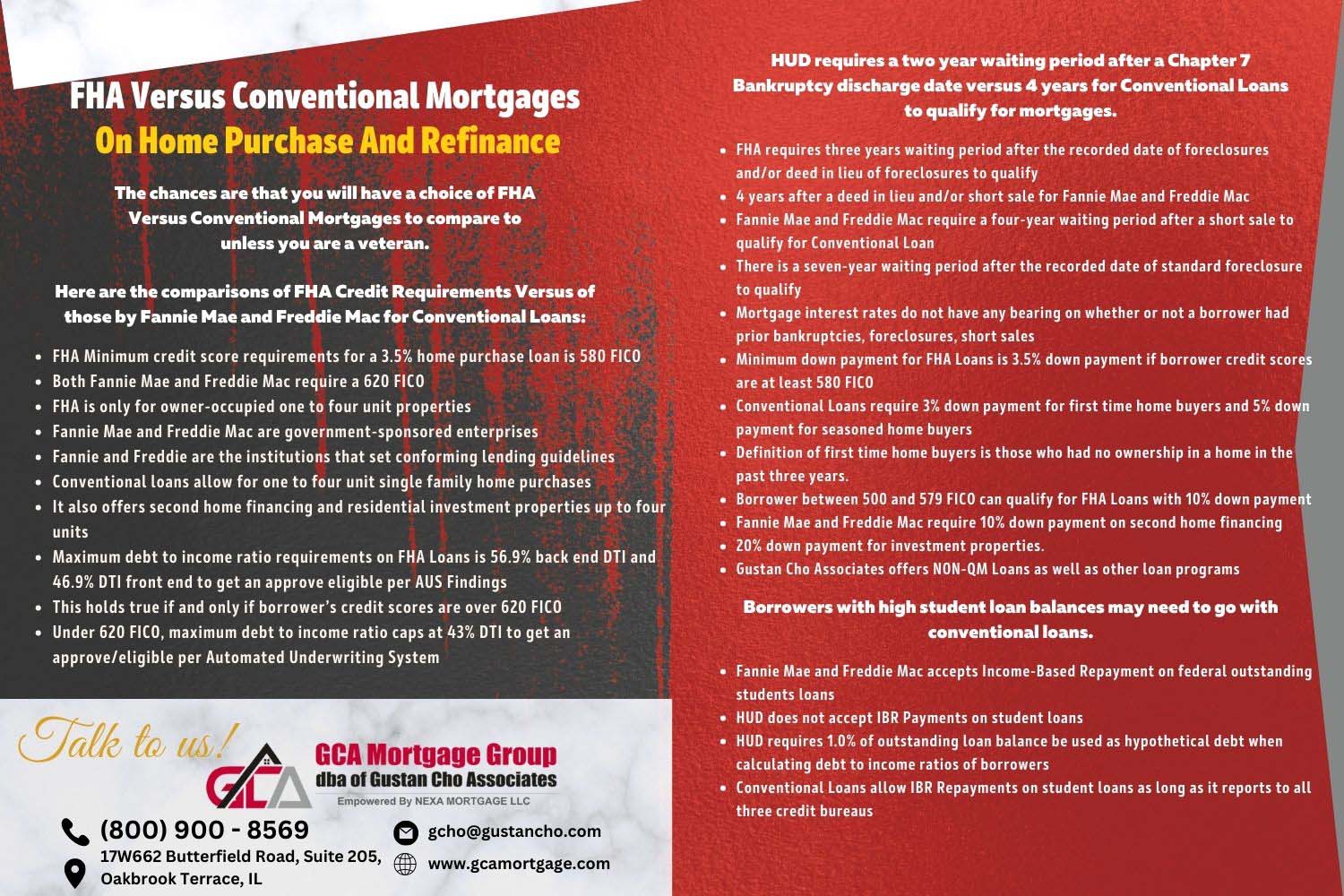FHA Versus Conventional Mortgages on Purchase and Refinance
In this blog, we will cover the comparison of FHA versus conventional mortgages on purchase and refinance transactions. Prior to home buyers starting the home buying process, it is highly recommended that they educate themselves on the type of loan program that is best for them.
Benefits of FHA Versus Conventional Mortgages For First-Time Homebuyers
Both FHA and Conventional loans have their own benefits. It depends on the individual borrower which loan program is best suited for them. In the following paragraphs, we will cover the differences between FHA versus conventional mortgages.
How Much Home Can I Afford Versus Qualify?
Borrowers should know not just how much they qualify but how much they can afford. Home buyers need to seek the advice of a loan officer. Need to go over the best loan program that is best suited for their needs and long-term goals. The two most common loan programs are FHA and Conventional loans. Buyers need to weigh the pros and cons of FHA versus Conventional mortgages
Not Sure Whether to Choose an FHA or Conventional Mortgage? Let Us Help You Decide!
FHA and conventional mortgages each have unique benefits for purchasing and refinancing. Contact us today to compare both options and find the best loan for your needs.
Benefits of VA and FHA Versus Conventional Mortgages
The chances are you will have a choice of FHA Versus Conventional Mortgages to compare unless you are a veteran. Veterans have the option of VA Loans, which is most likely the best mortgage residential mortgage program available. Unfortunately, VA loans are limited to Veterans with a valid Certificate of Eligibility. It is important borrowers fully understand what FHA Versus Conventional Mortgages are as well as the pros and cons of the two programs. Need to weigh the pros and cons and see which program best benefits the borrower.
What Type of Mortgage Loan Is Better FHA or Conventional?
Alex Carlucci, a senior loan officer at Gustan Cho Associates, says the following about FHA loans:
Comparing Requirements on FHA Versus Conventional Mortgages
We will be covering the comparisons of FHA credit requirements versus Fannie Mae and Freddie Mac for Conventional loans. HUD minimum credit score requirement for a 3.5% home purchase loan is 580 FICO. Both Fannie Mae and Freddie Mac require a 620 FICO for conventional loans. FHA is only for owner-occupied one to four-unit properties. Fannie Mae and Freddie Mac are government-sponsored enterprises. Fannie and Freddie are the institutions that set conforming lending guidelines. Conventional loans allow for one to four-unit single-family home purchases. It also offers second home financing and residential investment properties up to four units.
FHA Versus Conventional Mortgages on Debt-To-Income Ratio
Maximum debt-to-income ratio requirements on FHA loans is 56.9% back-end DTI and 46.9% DTI front end to get an approve/eligible per AUS Findings. This holds true if and only if the borrower’s credit scores are over 580 FICO. Under 580 FICO, the maximum debt-to-income ratio caps at 43% DTI to get an approve/eligible per Automated Underwriting System. The maximum debt-to-income ratio on conventional loans is 50%. There is no front-end debt-to-income ratio cap on conventional loans.
FHA Versus Conventional Mortgages on Student Loans
Borrowers with high student loan balances may need to opt for FHA loans. The maximum debt-to-income ratio cap on FHA loans is 46.9% front-end and 56.9% back-end. Fannie Mae and Freddie Mac do not have a maximum front-end debt-to-income ratio cap. The maximum debt-to-income ratio cap on conventional loans is 50% debt-to-income ratio back end. Both HUD and Fannie Mae and Freddie Mac accept Income-Based Repayment on federal outstanding student loans. HUD now accepts IBR Payments on student loans.
FHA Versus Conventional Mortgages on Deferred Student Loans
Both Fannie Mae, Freddie Mac, and HUD require 0.50% of the outstanding loan balance to be used as hypothetical debt when calculating the debt-to-income ratios of borrowers on deferred student loans. FHA and Conventional loans allow IBR Repayments on student loans as long as it reports to all three credit bureaus.
FHA or Conventional Mortgage—Which One is Right for Your Purchase or Refinance?
Reach out now to explore which option is best for your home purchase or refinance.
Government and Conventional Loans After Bankruptcy and Foreclosure
HUD requires a two-year waiting period after a Chapter 7 Bankruptcy discharge date versus 4 years for Conventional Loans to qualify for mortgages. HUD requires three years waiting period after the recorded date of foreclosures and/or deed in lieu of foreclosures to qualify. 4 years after a deed in lieu and/or short sale for Fannie Mae and Freddie Mac.
Fannie Mae and Freddie Mac Guidelines After Foreclosure
Fannie Mae and Freddie Mac require a four-year waiting period after a short sale to qualify for a Conventional loan. There is a seven-year waiting period after the recorded date of standard foreclosure to qualify. Mortgage interest rates do not have any bearing on whether or not a borrower had prior bankruptcies, foreclosures, or short sales.
FHA Versus Conventional Mortgages Down Payment Guidelines
The minimum down payment for FHA Loans is a 3.5% down payment if the borrower’s credit scores are at least 580 FICO. Conventional Loans require a 3% down payment for first-time home buyers and a 5% down payment for seasoned home buyers. The definition of first-time home buyers is those who had no ownership of a home in the past three years. Borrowers between 500 and 579 FICO can qualify for FHA Loans with a 10% down payment. Fannie Mae and Freddie Mac require a 10% down payment on second home financing. 20% down payment for investment properties. Gustan Cho Associates offers NON-QM Loans as well as other loan programs.
Frequently Asked Questions (FAQs): FHA Versus Conventional Mortgages
What’s the main difference between FHA versus Conventional mortgages?
FHA loans are insured by the government and are easier to qualify for if you have lower credit or a small down payment. Conventional loans are not government-backed and usually require higher credit scores and larger down payments.
Which is better for first-time homebuyers: FHA or Conventional?
If you have a lower credit score or limited savings, an FHA loan is often better. If you have good credit and at least 3% to 5% down, a Conventional loan might save you more money long term.
What credit score do I need for an FHA loan?
You can get an FHA loan with as low as 580 credit score (with 3.5% down) or even 500 (with 10% down).
What credit score do I need for a Conventional loan?
Almost all lenders require a 620 minimum credit score for Conventional loans, but you’ll get better rates with a credit score of 740 or higher.
Do FHA and Conventional loans have different down payment requirements?
Yes. FHA: 3.5% down (if your score is 580 or higher). Conventional: As low as 3% for first-time buyers, 5% for others
Can I refinance with both FHA and Conventional loans?
Yes. FHA loans offer streamline refinance with no income or appraisal needed. Conventional loans offer rate-and-term and cash-out refinance options with more flexibility for high-equity borrowers.
Which loan has lower monthly payments?
FHA loans often have lower rates but include mortgage insurance for life (unless you refinance). Conventional loans may have slightly higher rates, but you can cancel PMI once you have 20% equity.
Can I use gift money for the down payment?
Yes, both FHA and Conventional loans allow gift funds—but FHA is more flexible, especially if the borrower has limited savings.
What are the mortgage insurance rules for each?
- FHA: Requires upfront mortgage insurance and monthly MIP for life (unless you put 10% down, then it lasts 11 years).
- Conventional: Requires PMI if you put less than 20% down, but you can cancel it when you reach 20% equity.
Which loan type is best for refinancing?
It depends on your situation: Use an FHA Streamline Refinance if you already have an FHA loan and want to lower your rate with less paperwork. Consider a Conventional refinance if you want to get rid of FHA mortgage insurance or cash out equity with better terms.
Should You Choose FHA or Conventional for Your Home Purchase or Refinance? Let’s Break It Down!
Reach out now to discuss the pros and cons of FHA versus conventional loans.








